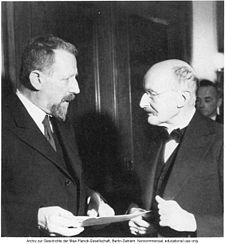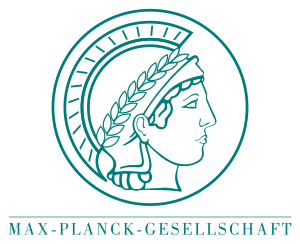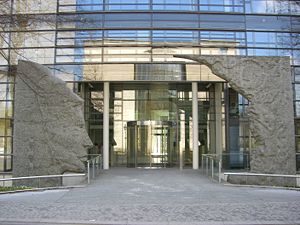- Max Planck Society
-
Max Planck Society 
Eugen Fischer (Director of the Kaiser Wilhelm Institute for Anthropology) with Max Planck, circa 1940Formation 1948 / 1911 (foundation of Kaiser Wilhelm Society) Budget €1.4 billion (2006) Staff 13000 Website mpg.de The Max Planck Society for the Advancement of Science (German: Max-Planck-Gesellschaft zur Förderung der Wissenschaften Eingetragener Verein; abbreviated MPG) is a formally independent non-governmental and non-profit association of German research institutes publicly funded by the federal and the 16 state governments of Germany.
The nearly 80 research institutes of the Max Planck Society conduct basic research in the interest of the general public in the natural sciences, life sciences, social sciences, and the arts and humanities. They have a total staff of approx. 13,000 permanent employees, including 4,700 scientists, plus around 11,000 non-tenured scientists and guests. Their budget for 2006 was about €1.4 billion, with 84% from state and federal funds.[1] The Max Planck Institutes focus on excellence in research, with 32 Nobel Prizes awarded to their scientists, and are generally regarded as the foremost basic research organization in Germany and Europe.
Other notable networks of publicly funded research institutes in Germany are the Fraunhofer-Gesellschaft, performing applied research with a focus on industrial collaborations, the Helmholtz Association of German Research Centres, a network of the national laboratories in Germany, and the Gottfried Wilhelm Leibniz Scientific Community, a loose network of institutes performing basic to applied research.
Contents
History
The organisation was established in 1911 as the Kaiser Wilhelm Society, or Kaiser-Wilhelm-Gesellschaft (KWG), a non-governmental research organisation named for the then German emperor. The KWG was one of the world's leading research organisations; its board of directors included scientists like Walther Bothe, Peter Debye, Albert Einstein, Fritz Haber and Werner Heisenberg. In 1946, Otto Hahn assumed the position of President of KWG, and in 1948, the society was renamed the Max Planck Society (MPG) after its former President (1930–37) Max Planck, who was recently deceased.
The Max Planck Society has a world-leading reputation as a science & technology research organization. In 2006, the Times Higher Education Supplement rankings[2] of non-university research institutions (based on international peer review by academics) placed the Max Planck Society as No.1 in the world for science research, and No.3 in technology research (behind AT&T and the Argonne National Laboratory in the United States).
The domain mpg.de attracted at least 1.7 million visitors annually by 2008 according to a Compete.com study.[3]
List of presidents of the KWG and the MPG
- Adolf von Harnack (1911–1930)
- Max Planck (1930–1937)
- Carl Bosch (1937–1940)
- Albert Vögler (1941–1945)
- Max Planck (16 May 1945 - 31 March 1946)
- Otto Hahn (as President of the KWG 1946 and then as President of the MPG 1948-1960)
- Adolf Butenandt (1960–1972)
- Reimar Lüst (1972–1984)
- Heinz Staab (1984–1990)
- Hans F. Zacher (1990–1996)
- Hubert Markl (1996–2002)
- Peter Gruss (since 2002)
Organization
The Max Planck Society is formally an eingetragener Verein, a registered association with the institute directors as scientific members having equal voting rights.[4] The society has its registered seat in Berlin, while the administrative headquarters are located in Munich. In 2002 the cell biologist Peter Gruss assumed the office of President of the MPG.
Funding is provided predominantly from federal and state sources, but also from research and license fees and donations. One of the larger donations from the Duke of Bavaria in 1967 was the castle Schloss Ringberg near Kreuth in Bavaria. The castle passed to the Max Planck Society after the death of the duke in 1973 and is now used for conferences.
Max Planck Institutes and Research Groups
The Max Planck Society consists of nearly 80 research institutes. In addition, the society funds a number of Max Planck Research Groups (MPRG) and International Max Planck Research Schools (IMPRS). The purpose of establishing independent research groups at various universities is to strengthen the required networking between universities and institutes of the Max Planck Society.
The research units are located all over Germany and in other European countries. The society is currently planning its first non-European centre, with an institute on the Jupiter campus of Florida Atlantic University to focus on bioimaging.[5]
The Max Planck Institutes operate independently from, though in close cooperation with, the universities, and focus on innovative research which does not fit into the university structure due to their interdisciplinary or transdisciplinary nature or which require resources that cannot be met by the state universities.
Internally, Max Planck Institutes are organized into research departments headed by directors such that each MPI has several directors, a position roughly comparable to anything from full professor to department head at a university.
Currently, the following institutes and research groups exist:
- Max Planck Institute for the Biology of Ageing, Köln
- Max Planck Institute for Evolutionary Anthropology, Leipzig
- Max Planck Institute for Social Anthropology, Halle/Saale
- Bibliotheca Hertziana - Max Planck Institute of Art History, Rome
- Max Planck Institute for Astronomy, Heidelberg
- Max Planck Institute for Astrophysics, Garching
- Max Planck Institute of Biochemistry, Martinsried
- Max Planck Institute for Biogeochemistry, Jena
- Max Planck Institute for Bioinorganic Chemistry, Mülheim/Ruhr, formerly Max Planck Institute for Radiation Chemistry
- Max Planck Institute for Molecular Biomedicine, Münster
- Max Planck Institute for Biophysical Chemistry (Karl Friedrich Bonhoeffer Institute), Göttingen
- Max Planck Institute for Biophysics, Frankfurt/Main
- Max Planck Institute for Brain Research, Frankfurt/Main
- Max Planck Institute for Molecular Cell Biology and Genetics, Dresden
- Max Planck Institute for Chemistry (Otto Hahn Institute), Mainz
- Max Planck Institute for Coal Research, Mülheim/Ruhr
- Max Planck Institute for Human Cognitive and Brain Sciences, Leipzig
- Max Planck Institute for Research on Collective Goods, Bonn, formerly Max Planck Project Group Common Goods, Law, Politics and Economics
- Max Planck Institute for Colloids and Interfaces, Golm (Potsdam)
- Max Planck Institute for Biological Cybernetics, Tübingen
- Max Planck Institute for Demographic Research, Rostock
- Max Planck Institute for Developmental Biology, Tübingen
- Max Planck Institute for the Study of Religious and Ethnic Diversity, Göttingen, formerly Max Planck Institute for History
- Max Planck Institute for Dynamics and Self-Organization, Göttingen, formerly Max Planck Institute for Flow Research
- Max Planck Institute for Dynamics of Complex Technical Systems, Magdeburg
- Max Planck Institute for Chemical Ecology, Jena
- Max Planck Institute of Economics, Jena
- Max Planck Institute for Experimental Endocrinology, Hanover
- Max Planck Institute for Extraterrestrial Physics, Garching
- Max Planck Research Unit for Enzymology of Protein Folding, Halle/Saale
- Max Planck Institute for Evolutionary Biology, Plön, formerly Max Planck Institute of Limnology
- Max Planck Florida Institute, Palm Beach, Florida
- The Friedrich Miescher Laboratory of the MPG, Tübingen
- Fritz Haber Institute of the MPG, Berlin
- Max Planck Institute for Molecular Genetics, Berlin
- Max Planck Institute for Gravitational Physics (Albert Einstein Institute), Golm (Potsdam)
- Max Planck Institute for Heart and Lung Research (W. G. Kerckhoff Institute), Bad Nauheim, formerly Max Planck Institute for Physiological and Clinical Research
- Max Planck Institute for the History of Science, Berlin
- Max Planck Institute for Human Development, Berlin
- Max Planck Institute for Immunobiology and Epigenetics, Freiburg
- Max Planck Institute for Infection Biology, Berlin
- Max Planck Institute for Informatics, Saarbrücken
- Max Planck Institute for Intellectual Property and Competition Law, München
- Max Planck Institute for Iron Research GmbH, Düsseldorf
- Max Planck Institute for Foreign and International Criminal Law, Freiburg
- Max Planck Institute for Comparative Public Law and International Law, Heidelberg
- Max Planck Institute for Comparative and International Private Law, Hamburg
- Max Planck Institute for Foreign and International Social Law, München
- Max Planck Institute for European Legal History, Frankfurt/Main
- Max Planck Institute for Mathematics, Bonn
- Max Planck Institute for Mathematics in the Sciences, Leipzig
- Max Planck Institute for Medical Research, Heidelberg
- Max Planck Institute for Experimental Medicine, Göttingen
- Max Planck Institute for Metals Research, Stuttgart
- Max Planck Institute for Meteorology,[1], Hamburg
- Max Planck Institute for Marine Microbiology, Bremen
- Max Planck Institute for Terrestrial Microbiology, Marburg
- Max Planck Institute for Microstructure Physics, Halle/Saale
- Max Planck Working Groups for Structural Molecular Biology at DESY, Hamburg
- Max Planck Institute of Neurobiology, Martinsried
- Max Planck Institute for Neurological Research, Köln
- Max Planck Institute for Ornithology, Andechs-Erling (Biological Rhythms and Behaviour), Radolfzell, Seewiesen (Reproductive Biology and Behaviour)[2]
- Max Planck Institute for Physics (Werner Heisenberg Institute), München
- Max Planck Institute for Nuclear Physics, Heidelberg
- Max Planck Institute for the Physics of Complex Systems, Dresden
- Max Planck Institute for the Chemical Physics of Solids, Dresden
- Max Planck Institute for Behavioral Physiology, Seewiesen closing
- Max Planck Institute for Molecular Physiology, Dortmund
- Max Planck Institute for Molecular Plant Physiology, Golm (Potsdam)
- Max Planck Institute for Plant Breeding Research, Köln
- Max Planck Institute for Plasma Physics, Garching and Greifswald
- Max Planck Institute for Polymer Research, Mainz
- Max Planck Institute of Psychiatry, München
- Max Planck Institute for Psycholinguistics, Nijmegen
- Max Planck Institute for the Science of Light, Erlangen
- Max Planck Institute for Software Systems, Kaiserslautern and Saarbrücken
- Max Planck Institute for Solar System Research, formerly Max Planck Institute for Aeronomy, Lindau (Katlenburg-Lindau)
- Max Planck Institute for Solid State Research, Stuttgart
- Max Planck Institute for the Study of Societies, Köln
- Max Planck Institute for Tax Law and Public Finance, Munich
International Max Planck Research Schools
Together with the Association of Universities and other Education Institutions in Germany, the Max Planck Society established numerous International Max Planck Research Schools (IMPRS) to promote junior scientists:
- International Max Planck Research School for Advanced Materials, Stuttgart
- International Max Planck Research School for Analysis, Design and Optimization in Chemical and Biochemical Process Engineering [3], Magdeburg
- International Max Planck Research School for Astronomy and Cosmic Physics, Heidelberg at the MPI for Astronomy
- International Max Planck Research School for Astrophysics, Garching at the MPI for Astrophysics
- International Max Planck Research School for Complex Surfaces in Material Sciences [4], Berlin
- International Max Planck Research School for Computer Science [5], Saarbrücken
- International Max Planck Research School for Earth System Modeling [6], Hamburg
- International Max Planck Research School for Elemantary Particle Physics [7], Munich, at the MPI for Physics
- International Max Planck Research School for Environmental, Cellular and Molecular Microbiology, Marburg at the Max Planck Institute for Terrestrial Microbiology
- International Max Planck Research School for Evolutionary Biology [8], Plön at the Max Planck Institute for Evolutionary Biology
- International Max Planck Research School for Global Biogeochemical Cycles [9], Jena
- International Max Planck Research School on Gravitational Wave Astronomy [10], Hannover and Potsdam MPI for Gravitational Physics
- International Max Planck Research School for Language Sciences [11], Nijmegen
- International Max Planck Research School for Neurosciences [12], Göttingen
- International Max Planck Research School for Marine Microbiology (MarMic) [13], joint program of the Max Planck Institute for Marine Microbiology in Bremen, the University of Bremen, the Alfred Wegener Institute for Polar and Marine Research in Bremerhaven, and the Jacobs University Bremen
- International Max Planck Research School for Molecular and Cellular Biology, Freiburg
- International Max Planck Research School for Molecular and Cellular Life Sciences [14], Munich
- International Max Planck Research School for Molecular Biology [15], Göttingen
- International Max Planck Research School for Molecular Cell Biology and Bioengineering [16], Dresden
- International Max Planck Research School Molecular Biomedicine [17], program combined with the 'Graduate Programm Cell Dynamics And Disease' at the University of Münster and the Max Planck Institute for Molecular Biomedicine
- International Max Planck Research School on Physical Processes in the Solar System and Beyond, Katlenburg-Lindau at the MPI for Solar System Research
- International Max Planck Research School for Radio and Infrared Astronomy, Bonn at MPI for Radio Astronomy
- International Max Planck Research School for the Social and Political Constitution of the Economy [18], Cologne
- International Max Planck Research School for Surface and Interface Engineering in Advanced Materials, Düsseldorf at Max Planck Institute for Iron Research GmbH
- International Max Planck Research School for Ultrafast Imaging and Structural Dynamics [19], Hamburg
Former institutes
Among others:
- Max Planck Institute for Aeronomics in Katlenburg-Lindau was renamed to Max Planck Institute for Solar System Research in 2004
- Max Planck Institute for Biology in Tübingen was closed in 2005
- Max Planck Institute for Cell Biology in Ladenburg b. Heidelberg was closed 2003
- Max Planck Institute for Ionospheric Research in Katlenburg-Lindau was renamed to Max Planck Institute for Aeronomics in 1958
- Max Planck Institute of Oceanic Biology in Wilhelmshaven renamed to Max Planck Institute of Cell Biology in 1968 and moved to Ladenburg 1977
- Max Planck Institute for Psychological Research in München merged into the Max Planck Institute for Human Cognitive and Brain Sciences in 2004
- Max Planck Institute for Protein and Leather Research in Regensburg moved to Munich 1957 and was united with the Max Planck Institute for Biochemistry in 1977
- Max Planck Institute for Virus Research in Tübingen since 1985 Max Planck Institute for Developmental Biology
- "Max-Planck-Institut zur Erforschung der Lebensbedingungen der wissenschaftlich-technischen Welt" in Starnberg (from 1970 until 1981 (closed)) directed by Carl Friedrich von Weizsäcker and Jürgen Habermas
Nobel Laureates
Max-Planck-Society (since 1948)
- Gerhard Ertl, Nobel prize chemistry 2007
- Theodor W. Hänsch, Nobel prize physics 2005
- Christiane Nüsslein-Volhard, Nobel prize medicine 1995
- Paul Crutzen, Nobel prize chemistry 1995
- Erwin Neher, Nobel prize medicine 1991
- Bert Sakmann, Nobel prize medicine 1991
- Robert Huber, Nobel prize chemistry 1988
- Hartmut Michel, Nobel prize chemistry 1988
- Johann Deisenhofer, Nobel prize chemistry 1988
- Ernst Ruska, Nobel prize physics 1986
- Klaus von Klitzing, Nobel prize physics 1985
- Georges Köhler, Nobel prize medicine 1984
- Konrad Lorenz, Nobel prize medicine 1973
- Manfred Eigen, Nobel prize chemistry 1967
- Feodor Lynen, Nobel prize medicine 1964
- Karl Ziegler, Nobel prize chemistry 1963
- Walter Bothe, Nobel prize physics 1954
Kaiser-Wilhelm-Society (1914-1948)
- Otto Hahn, Nobel prize chemistry 1944
- Adolf Butenandt, Nobel prize chemistry 1939
- Richard Kuhn, Nobel prize chemistry 1938
- Peter J. W. Debye, Nobel prize chemistry 1936
- Hans Spemann, Nobel prize medicine 1935
- Werner Heisenberg, Nobel prize physics 1932
- Otto Heinrich Warburg, Nobel prize medicine 1931
- Carl Bosch, Nobel prize chemistry 1931
- James Franck, Nobel prize physics 1925
- Otto Meyerhof, Nobel prize medicine 1922
- Albert Einstein, Nobel prize physics 1921
- Max Planck, Nobel prize physics 1918
- Fritz Haber, Nobel prize chemistry 1918
- Richard Willstätter, Nobel prize chemistry 1915
- Max von Laue, Nobel prize physics 1914
See also
- Harnack medal
- Max Planck
- Kaiser Wilhelm Institute
- Research Materials: Max Planck Society Archive
- Schloss Ringberg
- Interdisciplinarity
- Transdisciplinarity
Literature
- Alison Abbott: German science starts facing up to its historical amnesia, in: Nature Vol 403 (2000), S.474f. (article about the Commission for the history of the Kaiser-Wilhelm-Gesellschaft under National Socialism)
- Gretchen Vogel: Aufbau Ost: Max Planck's East German Experiment, in: Science Vol. 326, 6. November 2009 (about the new institutes in the eastern part of Germany)
References
- ^ "MPG Facts and Figures". http://www.mpg.de/english/aboutTheSociety/aboutUs/factsAndFigures/index.html. Retrieved 2009-03-01.
- ^ "Top non-university institutions in science". Times Higher Education Supplement. http://www.timeshighereducation.co.uk/hybrid.asp?typeCode=164. Retrieved 2009-03-01.
- ^ "Max Planck Society attracts almost 2m visitors online yearly". http://siteanalytics.compete.com/mpg.de?metric=uv. Retrieved 2009-03-01.
- ^ "MPG Organization". http://www.mpg.de/english/aboutTheSociety/aboutUs/organization/index.html. Retrieved 2009-03-01.
- ^ Check, Erika (20 September 2007). "Florida courts German life-sciences institute". Nature 449 (7160): 264–265. doi:10.1038/449264b. PMID 17882174.
External links
Categories:- 1948 establishments
- Scientific organisations based in Germany
- Max Planck Society
- Research institutes in Germany
Wikimedia Foundation. 2010.


